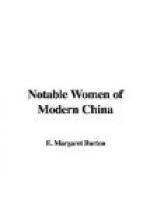“This old city of Nanchang with about three hundred thousand inhabitants, and surrounded by a thickly settled country, has not a single educated physician,” one of her letters reads. “Do you know what that means? The people realize their need and asked us to go and live among them. One of the church members offered to give us, free of charge, a piece of land situated in a fine part of the city, for either a hospital or a school lot. The pastor said he could raise $1,000 among the people if we would only begin medical work there. Do you think we ought to refuse that offer, which is a wonderful one, because the church has only just been established there? ’And when they came to Jesus they besought Him instantly, saying that he was worthy for whom He should do this.’”
The people of Nanchang, both Christian and non-Christian, pleaded so eagerly for medical work, and promised to do so much toward its support, that the missionaries agreed with Dr. Kahn in feeling that a door to great opportunity was open before her, which it would be a serious mistake not to enter. Accordingly, early in 1903, she responded to what Dr. Stone termed “the Macedonian call,” and began work in Nanchang.
The Woman’s Foreign Missionary Society did not feel able to assume any responsibility for the financial support of the medical work in the new field, beyond that of the doctor’s salary. But Dr. Kahn firmly believed that missionary work should be just as nearly self-supporting as possible; and since many of the urgent invitations from Nanchang had come from homes of wealth, she was very willing to attempt to carry on medical work there on a self-supporting basis. In an article on the subject of self-supporting medical missionary work, written for the China Medical Missionary Journal, she gave some of her reasons for believing in self-support, and her theories as to how it might be carried out.
“To the many of us, no doubt, the thought naturally arises that we have enough problems to deal with in our work without having to take up the irksome question of self-support. Yet at the present time, when every strenuous effort is being made to evangelize the world in this generation, any plan which can help forward such a movement at once assumes an aspect of vital importance in our eyes. Let it not be presumed that self-support is to be recommended as possible to every medical missionary. On the contrary, I fear, only by those fortunate enough to be located in large cities could the effort be attempted with any hope of success. Yet in a measure the question concerns every one of us, because in its different phases self-support is sure to be pressed upon all of us with more or less force. Personally, my work was undertaken in Nanchang partly from faith in the principle, partly because there were no funds available to institute medical work on any other basis. My faith in the principle is founded upon the belief that anything of value




